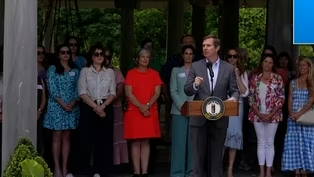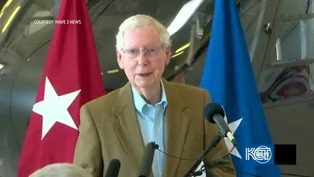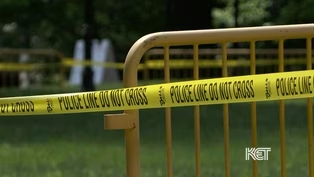
Report: Kentucky Sees Fewer Medical Residency Applicants after Passing Abortion Law
Clip: Season 2 Episode 263 | 4m 3sVideo has Closed Captions
Report: Kentucky sees fewer medical residency applicants after passing abortion law.
Following the U.S. Supreme Court decision overturning Roe vs Wade, Kentucky enacted one of the most restrictive abortion laws in the country, permitting abortions only to save a pregnant mother from death or permanent disability. A left-leaning medical organization says there are more than just legal ramifications from these laws.
Problems playing video? | Closed Captioning Feedback
Problems playing video? | Closed Captioning Feedback
Kentucky Edition is a local public television program presented by KET

Report: Kentucky Sees Fewer Medical Residency Applicants after Passing Abortion Law
Clip: Season 2 Episode 263 | 4m 3sVideo has Closed Captions
Following the U.S. Supreme Court decision overturning Roe vs Wade, Kentucky enacted one of the most restrictive abortion laws in the country, permitting abortions only to save a pregnant mother from death or permanent disability. A left-leaning medical organization says there are more than just legal ramifications from these laws.
Problems playing video? | Closed Captioning Feedback
How to Watch Kentucky Edition
Kentucky Edition is available to stream on pbs.org and the free PBS App, available on iPhone, Apple TV, Android TV, Android smartphones, Amazon Fire TV, Amazon Fire Tablet, Roku, Samsung Smart TV, and Vizio.
Providing Support for PBS.org
Learn Moreabout PBS online sponsorshipIt's been almost two years since the US Supreme Court overturned Roe v Wade, putting the issue of abortion back into state houses across the country.
Following that decision, Kentucky enacted one of the most restrictive abortion laws in the country, permitting abortions only to save a pregnant mother from death or permanent disability.
A left leaning medical organization says there are more than just legal ramifications from these laws, and Kentucky is seeing a decrease in residency applications from medical school graduates.
Here's more.
What we found both last year and this year was a disproportionate drop in applications across specialties from these U.S. medical graduates who are applying to residency training in states where there were either essentially complete elimination of availability of abortion or severe restrictions and in terms of gestational limits.
So it looks like U.S. medical school graduates are disproportionately avoiding those states like Kentucky, where reproductive health care is restricted in some ways.
And that is seen, again, not just in specialties like obstetrics and gynecology, where you'd think that, yes, that might have a significant effect, but really in all specialties across the board.
So we saw a natural drop off in the number of applications that were submitted this year compared to last year.
The way that translates down at the state level is the average state saw about a 10% drop off in the number of unique applicants this year compared to the year before.
For all the specialties and all the programs in their states.
In Kentucky, that was about 50% greater at a 15% drop off.
So that looks significant.
And I will say that in individual specialties like obstetrics and gynecology over the last two years, you've seen probably closer to a 25% decrease in the number of new U.S. M.D.
graduates that are applying for OBGYN programs at Kentucky itself.
A lot of states like Kentucky have found that if you want to attract physicians to underserved communities, your best bet at doing that is by taking people who are from those communities, those kind of communities within that state, and keeping them in the state for college, for medical school, or for residency training.
But what you may be seeing now, and I think anecdotally from the stories we're hearing from these new physicians who are graduating from medical school is, hey, I would love to stay here in Kentucky or West Virginia.
I went to med school here.
My family's from here.
I want to serve these patients, but I can't practice medicine in the way that I believe is in the best interests of my patients.
The purpose of these papers is really not to say we think that states or policy makers should be doing X, Y, or Z.
What we want people to understand at the local and state policy level is you may have very specific goals for health care in your communities, like attracting people to the state, attracting them to rural and underserved communities.
These laws that are being passed that restrict reproductive health care may be working against the very policy goals that these states have laid out for decades.
And so I think each state needs to consider the ramifications of these laws, not just around what's the impact on care to individual women of reproductive age, but also what is the potential impact on the ability of the entire state's population to receive much needed appropriate health care?
During this year's legislative session.
There were efforts by both Democrats and Republicans to expand abortion access in Kentucky.
None made it to final passage.
Bowling Green Prepares For a Sweet Celebration in Honor of Native Son, Duncan Hines
Video has Closed Captions
Clip: S2 Ep263 | 1m 44s | Bowling Green prepares for a sweet celebration in honor of native son, Duncan Hines. (1m 44s)
Kentucky Sets a New Tourism Record
Video has Closed Captions
Clip: S2 Ep263 | 3m 10s | Kentucky sets a new tourism record. (3m 10s)
Sen. Mitch McConnell Tells Kentucky National Guard U.S. Has to Stand Up to Russia, China
Video has Closed Captions
Clip: S2 Ep263 | 1m 33s | Sen. Mitch McConnell tells Kentucky National Guard U.S. has to stand up to Russia, China. (1m 33s)
UK Holds Full Scale Emergency Drill on Campus
Video has Closed Captions
Clip: S2 Ep263 | 1m 54s | UK holds full scale emergency drill on campus. (1m 54s)
Providing Support for PBS.org
Learn Moreabout PBS online sponsorship
- News and Public Affairs

Top journalists deliver compelling original analysis of the hour's headlines.

- News and Public Affairs

FRONTLINE is investigative journalism that questions, explains and changes our world.












Support for PBS provided by:
Kentucky Edition is a local public television program presented by KET



